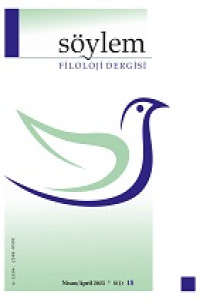Abstract
Bu çalışmada Jerzy Kosinski’nin II. Dünya Savaşı yıllarında gerçek bir yaşam öyküsünden hareketle 1965’te kaleme aldığı Boyalı Kuş (The Painted Bird) isimli romanı, Richard Sennett’in “yabancı” kuramı odağında yabancıya yönelik şiddet bağlamında sosyolojik olarak analiz edilmiştir. Çalışmada, Nazi Almanya’sının Yahudi ve Çingenelere karşı yürüttüğü katliamlar sürürken, savaş yıllarının toplumsal koşullarının ve politik ortamının Orta Avrupa kırsalında sefalet ve hastalık içinde yaşayan yoksul köylülere ilişkin toplumsal sonuçları göz ardı edilmeden, ten rengi dolayısıyla dışlanıp yabancı kılınarak şiddete uğrayan bir çocuğun bu köylerde yaşama tutunma mücadelesi incelenmiştir.
II. Dünya Savaşı’nın ortaya çıkardığı önemli bir gerçeklik, Nazi Almanya’sı ile özdeş tutulan ırkçılığın insanlık ailesi açısından telafisi güç sonuçlar meydana getirmiş olmasıdır. Alman Nazi ideolojisinin dünyanın tek egemeni olmak adına meşru gördüğü soykırım projesi, Yahudiler başta olmak üzere Çingeneler ve diğer korunmasız topluluklar ile Alman egemenliğini tanımayan uluslar üzerinde sınırsız bir şekilde kullanılırken, bunun etkilerinin söz konusu toplulukların çok daha ötesinde bir kırılma ile insanlık tarihinde yerini aldığı söylenebilir. Bu tablonun edebiyat ve sinema başta olmak üzere sanatın birçok dalında uzun yıllardır farklı biçimlerde işlendiği görülmektedir. Birçok dile çevrilen Boyalı Kuş romanı da otobiyografik özellikleriyle beraber II. Dünya Savaşı’na dair iz bırakan eserlerin başında gelmektedir. Romanda, önyargıların hedefindeki roman kahramanı olan bir çocuğun gözünden ırkçılığın yol açtığı şiddet ve ötekileştirmenin yanı sıra kendisinin de bunlara vermiş olduğu tepkilerin toplumsal gerçeklik olarak nasıl inşa edildiği irdelenmiştir.
Bu çalışmada Sennett’in “yabancı” kuramı ekseninde savaş, şiddet ve öteki gibi olguların Boyalı Kuş romanında sosyolojik olarak nasıl işlendiğine odaklanılmıştır.
Keywords
Supporting Institution
Yok
Project Number
Yok
Thanks
Editör kuruluna saygılar...
References
- Anand, Pulkita (2022). “Zami: A New Spelling Against Racism.” Representations of Violence in Literature, Culture and Arts Conference Proceedings 2021. Ed. Sümeyra Buran, Mahinur Akşehir vd. United Kingdom: Transnational Press London, 49-61.
- Arslan, Adnan (2019). “Suûd es-Sen’ûsî’nin Sâku’l-Bâmbû Romanında Aidiyetsizlik Bunalımı.” Cumhuriyet İlahiyat Dergisi, 23 (2): 993-1008.
- Bauman, Zygmunt (2016). Modernite ve Holokaust. Çev. Süha Sertabiboğlu. İstanbul: Alfa Yayınları.
Abstract
In this study, Jerzy Kosinski’s novel The Painted Bird, which he wrote in 1965 based on a real life story during the Second World War, was sociologically analyzed in the context of violence against foreigners, with the focus of Richard Sennett's “foreigner” theory. In the study, while the massacres carried out by Nazi Germany against Jews and Gypsies continued, the social consequences of the social conditions and political environment of the war years on the poor peasants living in misery and disease in the Central European countryside were considered and the struggle of a child who has been subjected to violence by being excluded and marginalized in these villages due to his skin color has been examined.
An important reality revealed by the Second World War is that racism, which was identified with Nazi Germany, had irreparable consequences for the human family. The genocidal project, which the German Nazi ideology saw as legitimate in order to become the sole sovereign of the world, was used unlimitedly on Jews, Gypsies and other vulnerable communities, as well as nations that did not recognize German sovereignty. It is seen that the results of this have taken their place in the history of humanity with a break far beyond these communities. It is seen that this table has been handled in many branches of art, especially literature and cinema, in different forms for many years. The Painted Bird novel, which has been translated into many languages, is one of the works that left its mark on the Second World War, together with its autobiographical features. In the novel, the violence and marginalization caused by racism are told through the eyes of a child who is the target of prejudices. In addition, it has been examined how the child's reactions to these are constructed as social reality.
This study focuses on how the phenomena such as war, violence and the other are handled sociologically in the The Painted Bird novel in line with Sennett’s theory of the “foreigner”.
Project Number
Yok
References
- Anand, Pulkita (2022). “Zami: A New Spelling Against Racism.” Representations of Violence in Literature, Culture and Arts Conference Proceedings 2021. Ed. Sümeyra Buran, Mahinur Akşehir vd. United Kingdom: Transnational Press London, 49-61.
- Arslan, Adnan (2019). “Suûd es-Sen’ûsî’nin Sâku’l-Bâmbû Romanında Aidiyetsizlik Bunalımı.” Cumhuriyet İlahiyat Dergisi, 23 (2): 993-1008.
- Bauman, Zygmunt (2016). Modernite ve Holokaust. Çev. Süha Sertabiboğlu. İstanbul: Alfa Yayınları.
Details
| Primary Language | Turkish |
|---|---|
| Subjects | Literary Studies |
| Journal Section | EDEBİYAT / ARAŞTIRMA MAKALELERİ |
| Authors | |
| Project Number | Yok |
| Publication Date | April 27, 2023 |
| Submission Date | January 4, 2023 |
| Acceptance Date | March 29, 2023 |
| Published in Issue | Year 2023 Volume: 8 Issue: 1 |

This work is licensed under a Creative Commons Attribution-NonCommercial-NoDerivatives 4.0 International License.


